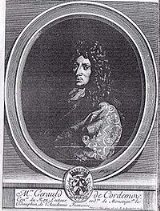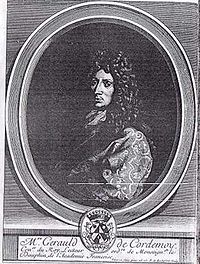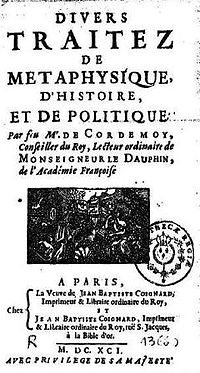
Géraud de Cordemoy
Encyclopedia
Géraud de Cordemoy, a French
philosopher, historian
and lawyer
. He is mainly known for his works in metaphysics
and for his theory of language.

university. As for Géraud, he was a private tutor and a linguist and practised as a lawyer.
Géraud de Cordemoy used to haunt the philosophical circles of the capital; he made acquaintance with Emmanuel Maignan
and Jacques Rohault
. A friend and a protégé of Bossuet
who admired Descartes too, Géraud de Cordemoy was appointed lecteur (tutor) to the Dauphin (son of King Louis XIV), at the same time as Fléchier. He was elected a member of Académie française
in 1675.
theory of causality
, introducing the notion of “occasional cause” within a system of thought which remains essentially Cartesian. He was, alongside Arnold Geulincx
and Louis de La Forge
, the founder of what is called “occasionalism
”. Body and soul are distinct by essence, their combination is occasional, and it is God who allows that the will to move my arm, for example, is translated into a movement. My will is an occasional cause of the movement of my arm, God is the real cause of it. What is true for the body-an individual constituted by the distinct combination of body and soul- is true for every body in the universe. God is the real and universal cause of every movement.
By body, Cordemoy means the ultimate components of matter. Using a judicial figure of speech, he shows that the body, in law a person, in physics an ultimate component of matter, is indivisible. Never mentioning atomism, with that theory he comes close to the followers of Gassendi
and to the free thinkers, the so called Libertine
s. In his work “Le discernement du corps et de l’âme” (Discrimination between body and soul) he develops such thoughts which were criticized at that time by the followers of Descartes.
In his work Discours physique de la parole (Physical Discourse on Speech), he asks himself the following question: how can I, as a thinking being, be certain that the human beings who surround me are also thinking beings, and not simple automatons? The problem is considered at the end of the sixth speech on discrimination between body and soul. It is the word as a vehicle of the thought which will enable me to know the existence of other individuals who are endowed with a soul like me. In a more original way, in his work “Traité physique de la parole”( physical treatise of the word)- a variation of the previous title - he develops the notion that no motivated relation between the material sign and the expressed idea exists, as much as no real relation exists between body and soul. The word represents the opportunity for sign and meaning to meet, so far as if the soul hadn’t the use of the articulated body to produce sign, it would communicate in a much more immediate way from soul to soul, without having to go through the institution of the sign.
The language used by human beings is therefore too complex to be explained by purely mechanical causes; I can deduce from it that the bodies I can see are also endowed with a soul. Animals may utter sounds and parrots may reproduce words, only human beings are able to communicate ideas, and that shows the presence of a rational soul. This rational soul is able to communicate directly with angels without going through the physical articulation of the sign. Le Discours, from which Molière
draw the scene of the spelling lesson in Le Bourgeois gentilhomme
, remains the most successful work of Cordemoy. American linguists such as George Boas
and Noam Chomsky
rediscovered him during the sixties.
Cordemoy is also known for his Histoire de France on which he worked for 18 years without ever seeing the end, so major were the contradictions he came up against while consulting the works of his predecessors. The work was finally finished by his elder son, Louis-Géraud de Cordemoy, and published after his death. Voltaire
said of the work of Cordemoy as a historian : “He was the first to be able to disentangle the chaos of the two first races of the kings of France
; thanks to the duke of Montausier
who charged Cordemoy with the writing of the history of Charlemagne
in view of the education of Monseigneur [the Dauphin], that useful work was achieved. He found in ancient authors nothing but absurdities and contradictions. That very difficulty encouraged him, and enabled him to disentangle the two first races”.

France
The French Republic , The French Republic , The French Republic , (commonly known as France , is a unitary semi-presidential republic in Western Europe with several overseas territories and islands located on other continents and in the Indian, Pacific, and Atlantic oceans. Metropolitan France...
philosopher, historian
Historian
A historian is a person who studies and writes about the past and is regarded as an authority on it. Historians are concerned with the continuous, methodical narrative and research of past events as relating to the human race; as well as the study of all history in time. If the individual is...
and lawyer
Lawyer
A lawyer, according to Black's Law Dictionary, is "a person learned in the law; as an attorney, counsel or solicitor; a person who is practicing law." Law is the system of rules of conduct established by the sovereign government of a society to correct wrongs, maintain the stability of political...
. He is mainly known for his works in metaphysics
Metaphysics
Metaphysics is a branch of philosophy concerned with explaining the fundamental nature of being and the world, although the term is not easily defined. Traditionally, metaphysics attempts to answer two basic questions in the broadest possible terms:...
and for his theory of language.

Biography
Géraud de Cordemoy was born in a family of ancient nobility coming from Auvergne (from the town of Royat). His father was a master in arts at ParisParis
Paris is the capital and largest city in France, situated on the river Seine, in northern France, at the heart of the Île-de-France region...
university. As for Géraud, he was a private tutor and a linguist and practised as a lawyer.
Géraud de Cordemoy used to haunt the philosophical circles of the capital; he made acquaintance with Emmanuel Maignan
Emmanuel Maignan
Emmanuel Maignan was a French physicist and Catholic Minimite theologian....
and Jacques Rohault
Jacques Rohault
Jacques Rohault was a French philosopher, physicist and mathematician, and a follower of Cartesianism.Rohault was born in Amiens, the son of a wealthy wine merchant, and educated in Paris. Having grown up with the conventional scholastic philosophy of his day, he adopted and popularised the new...
. A friend and a protégé of Bossuet
Louis Bossuet
Louis Bossuet was a French parlementaire.-Life:Bossuet was born in Dijon in 1663, the son of Antoine Bossuet , the seigneur of Azu, The Cosnée, and Vatronville Bonval, and Renée Madeleine Gaureault Mount , daughter of René de Nicolas Gaureault Mount, Marquis de la Perriere and Catherine of Hautoy...
who admired Descartes too, Géraud de Cordemoy was appointed lecteur (tutor) to the Dauphin (son of King Louis XIV), at the same time as Fléchier. He was elected a member of Académie française
Académie française
L'Académie française , also called the French Academy, is the pre-eminent French learned body on matters pertaining to the French language. The Académie was officially established in 1635 by Cardinal Richelieu, the chief minister to King Louis XIII. Suppressed in 1793 during the French Revolution,...
in 1675.
Works
Cordemoy is known primarily for having rethought the CartesianRené Descartes
René Descartes ; was a French philosopher and writer who spent most of his adult life in the Dutch Republic. He has been dubbed the 'Father of Modern Philosophy', and much subsequent Western philosophy is a response to his writings, which are studied closely to this day...
theory of causality
Causality
Causality is the relationship between an event and a second event , where the second event is understood as a consequence of the first....
, introducing the notion of “occasional cause” within a system of thought which remains essentially Cartesian. He was, alongside Arnold Geulincx
Arnold Geulincx
Arnold Geulincx was a Flemish philosopher. He was one of the followers of René Descartes who tried to work out more detailed versions of a generally Cartesian philosophy...
and Louis de La Forge
Louis de La Forge
Louis de La Forge was a French philosopher who in his Tractatus de mente humana expounded a doctrine of occasionalism...
, the founder of what is called “occasionalism
Occasionalism
Occasionalism is a philosophical theory about causation which says that created substances cannot be efficient causes of events. Instead, all events are taken to be caused directly by God...
”. Body and soul are distinct by essence, their combination is occasional, and it is God who allows that the will to move my arm, for example, is translated into a movement. My will is an occasional cause of the movement of my arm, God is the real cause of it. What is true for the body-an individual constituted by the distinct combination of body and soul- is true for every body in the universe. God is the real and universal cause of every movement.
By body, Cordemoy means the ultimate components of matter. Using a judicial figure of speech, he shows that the body, in law a person, in physics an ultimate component of matter, is indivisible. Never mentioning atomism, with that theory he comes close to the followers of Gassendi
Pierre Gassendi
Pierre Gassendi was a French philosopher, priest, scientist, astronomer, and mathematician. With a church position in south-east France, he also spent much time in Paris, where he was a leader of a group of free-thinking intellectuals. He was also an active observational scientist, publishing the...
and to the free thinkers, the so called Libertine
Libertine
A libertine is one devoid of most moral restraints, which are seen as unnecessary or undesirable, especially one who ignores or even spurns accepted morals and forms of behavior sanctified by the larger society. Libertines, also known as rakes, placed value on physical pleasures, meaning those...
s. In his work “Le discernement du corps et de l’âme” (Discrimination between body and soul) he develops such thoughts which were criticized at that time by the followers of Descartes.
In his work Discours physique de la parole (Physical Discourse on Speech), he asks himself the following question: how can I, as a thinking being, be certain that the human beings who surround me are also thinking beings, and not simple automatons? The problem is considered at the end of the sixth speech on discrimination between body and soul. It is the word as a vehicle of the thought which will enable me to know the existence of other individuals who are endowed with a soul like me. In a more original way, in his work “Traité physique de la parole”( physical treatise of the word)- a variation of the previous title - he develops the notion that no motivated relation between the material sign and the expressed idea exists, as much as no real relation exists between body and soul. The word represents the opportunity for sign and meaning to meet, so far as if the soul hadn’t the use of the articulated body to produce sign, it would communicate in a much more immediate way from soul to soul, without having to go through the institution of the sign.
The language used by human beings is therefore too complex to be explained by purely mechanical causes; I can deduce from it that the bodies I can see are also endowed with a soul. Animals may utter sounds and parrots may reproduce words, only human beings are able to communicate ideas, and that shows the presence of a rational soul. This rational soul is able to communicate directly with angels without going through the physical articulation of the sign. Le Discours, from which Molière
Molière
Jean-Baptiste Poquelin, known by his stage name Molière, was a French playwright and actor who is considered to be one of the greatest masters of comedy in Western literature...
draw the scene of the spelling lesson in Le Bourgeois gentilhomme
Le Bourgeois Gentilhomme
Le Bourgeois gentilhomme is a five-act comédie-ballet—a play intermingled with music, dance and singing—by Molière, first presented on 14 October 1670 before the court of Louis XIV at the Château of Chambord by Molière's troupe of actors...
, remains the most successful work of Cordemoy. American linguists such as George Boas
George Boas
George Boas was a Professor of Philosophy at Johns Hopkins University.He received his education at Brown University, obtaining both a BA and MA in Philosophy there, after which he studied...
and Noam Chomsky
Noam Chomsky
Avram Noam Chomsky is an American linguist, philosopher, cognitive scientist, and activist. He is an Institute Professor and Professor in the Department of Linguistics & Philosophy at MIT, where he has worked for over 50 years. Chomsky has been described as the "father of modern linguistics" and...
rediscovered him during the sixties.
Cordemoy is also known for his Histoire de France on which he worked for 18 years without ever seeing the end, so major were the contradictions he came up against while consulting the works of his predecessors. The work was finally finished by his elder son, Louis-Géraud de Cordemoy, and published after his death. Voltaire
Voltaire
François-Marie Arouet , better known by the pen name Voltaire , was a French Enlightenment writer, historian and philosopher famous for his wit and for his advocacy of civil liberties, including freedom of religion, free trade and separation of church and state...
said of the work of Cordemoy as a historian : “He was the first to be able to disentangle the chaos of the two first races of the kings of France
France
The French Republic , The French Republic , The French Republic , (commonly known as France , is a unitary semi-presidential republic in Western Europe with several overseas territories and islands located on other continents and in the Indian, Pacific, and Atlantic oceans. Metropolitan France...
; thanks to the duke of Montausier
Charles de Sainte-Maure, duc de Montausier
Charles de Sainte-Maure, duc de Montausier was a French soldier and the governor of the dauphin, Louis le Grand Dauphin, the eldest son and heir of Louis XIV, King of France....
who charged Cordemoy with the writing of the history of Charlemagne
Charlemagne
Charlemagne was King of the Franks from 768 and Emperor of the Romans from 800 to his death in 814. He expanded the Frankish kingdom into an empire that incorporated much of Western and Central Europe. During his reign, he conquered Italy and was crowned by Pope Leo III on 25 December 800...
in view of the education of Monseigneur [the Dauphin], that useful work was achieved. He found in ancient authors nothing but absurdities and contradictions. That very difficulty encouraged him, and enabled him to disentangle the two first races”.
Publications

- Discours de l’action des corps (1664)
- Traité de l'esprit de l'homme et de ses facultez et fonctions, et de son union avec le corps. Suivant les principes de René Descartes (1666)
- Le discernement du corps et de l'âme, en six discours, pour servir à l'éclaircissement de la physique (1666). Online text
- Discours physique de la parole (1668). Online text
- Copie d'une lettre écrite à un sçavant religieux de la Compagnie de Jésus, pour montrer : I, que le système de M. Descartes et son opinion touchant les bestes n'ont rien de dangereux ; II, et que tout ce qu'il en a écrit semble estre tiré du premier chapitre de la Genèse (1668). Online text
- Lettre d'un philosophe à un cartesien de ses amis (1672)
- Discours sur la pureté de l'esprit et du corps et par occasion de la vie innocente et juste des premiers Chrétiens (1677)
- Histoire de France, depuis le temps des Gaulois et le commencement de la monarchie, jusqu'en 987 (2 volumes, 1687-89). Complétée et publiée par son fils, Louis-Géraud de Cordemoy.
- Dissertations physiques sur le discernement du corps et de l'âme, sur la parole, et sur le système de M. Descartes (1689-90)
- Divers traitez de métaphysique, d'histoire et de politique (1691). Online text
- Geraud de Cordemoy, A Philosophical Discourse Concerning Speech, London, 1668. Facsimile ed., with A Discourse Written to a Learned Frier (1670), introd. by Barbara Ross, 1972, Scholars' Facsimiles & Reprints, ISBN 978082011063.
- Les Œuvres de feu monsieur de Cordemoy (1704). Publiées par son fils, Louis-Géraud de Cordemoy. Contiennent : Six discours sur la distinction et l'union des corps ; Discours physique sur la Parole ; Lettre sur la conformité du système de Descartes avec le premier chapitre de la Genèse ; Deux petits traités de métaphysique ; Divers petits traités sur l'histoire et sur la métaphysique ; Divers petits traités sur l'histoire et sur la politique.
- Gérauld de Cordemoy (1626-1684). Œuvres philosophiques. Avec une étude bio-bibliographique, Presses Universitaires de France, Paris, 1968

